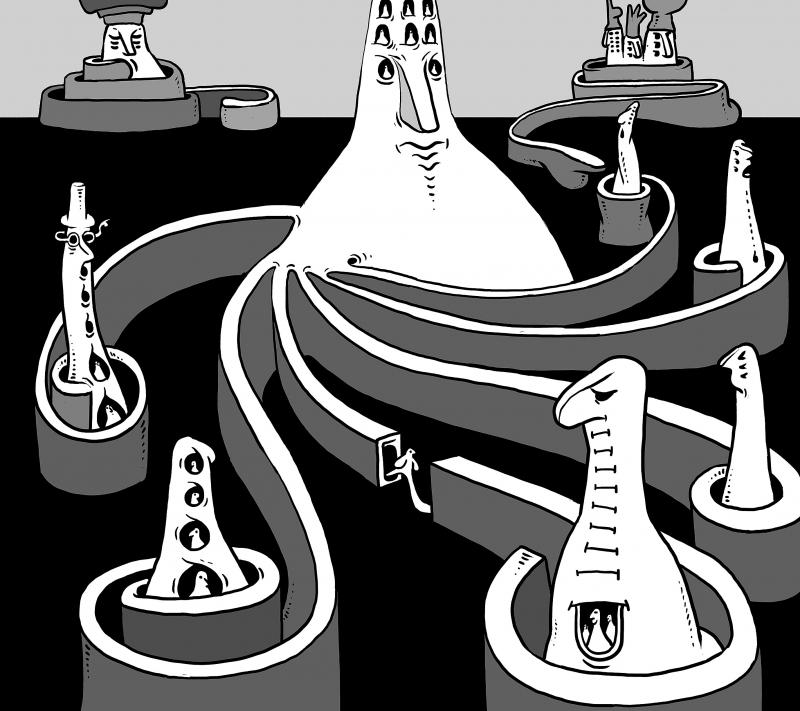After seven decades on the throne, Queen Elizabeth II is widely viewed in the UK as a rock in turbulent times, but in Britain’s former colonies, many see her as an anchor to an imperial past whose damage still lingers.
While the UK is celebrating the queen’s Platinum Jubilee — 70 years on the throne — with pageantry and parties, some in the Commonwealth are using the occasion to push for a formal break with the monarchy and the colonial history it represents.
“When I think about the queen, I think about a sweet old lady,” said Jamaican academic Rosalea Hamilton, who campaigns for her country to become a republic.

Illustration: Mountain People
“It’s not about her. It’s about her family’s wealth, built on the backs of our ancestors. We’re grappling with the legacies of a past that has been very painful,” she said.
The empire that Elizabeth was born into is long gone, but she still reigns far beyond Britain’s shores. She is head of state in 14 other nations, including Canada, Australia, Papua New Guinea and the Bahamas. Until recently it was 15 — Barbados cut ties with the monarchy last year, and several other Caribbean countries, including Jamaica, have said they plan to follow suit.
Britain’s jubilee celebrations, which climax over a four-day holiday weekend that began yesterday, aim to recognize the diversity of the UK and the Commonwealth. A huge jubilee pageant through central London on Sunday is set to feature Caribbean carnival performers and Bollywood dancers.
However, Britain’s image of itself as a welcoming and diverse society has been battered by the revelation that hundreds, and maybe thousands, of people from the Caribbean who had lived legally in the UK for decades were denied housing, jobs or medical treatment — and in some cases deported — because they did not have the paperwork to prove their status.
The British government has apologized and agreed to pay compensation, but the scandal has caused deep anger in the UK and in the Caribbean.
IMAGE PROBLEM
A jubilee-year trip to Belize, Jamaica and the Bahamas in March by the queen’s grandson, Prince William, and his wife, Kate, which was intended to bolster ties, appears to have had the opposite effect. Images of the couple shaking hands with children through a chain-link fence and riding in an open-topped Land Rover in a military parade stirred echoes of colonialism for many.
Cynthia Barrow-Giles, professor of political science at the University of the West Indies, said the British “seem to be very blind to the visceral sort of reactions” that royal visits elicit in the Caribbean.
Protesters in Jamaica demanded that Britain pay reparations for slavery, and Jamaican Prime Minister Andrew Holness politely told William that the country was “moving on,” a signal that it planned to become a republic. Antigua and Barbuda Prime Minister Gaston Browne in April told the queen’s son, Prince Edward, that his country would also one day remove the queen as head of state.
William acknowledged the strength of feeling and said the future “is for the people to decide upon.”
“We support with pride and respect your decisions about your future,” he said in the Bahamas. “Relationships evolve. Friendship endures.”
When Elizabeth became queen in 1952 on the death of her father, King George VI, she was in Kenya. The east African country became independent in 1963 after years of violent struggle between a liberation movement and colonial troops. In 2013, the British government apologized for the torture of thousands of Kenyans during the 1950s Mau Mau uprising and paid millions in an out-of-court settlement.
Memories of the empire are still raw for many Kenyans.
“From the start, her reign would be indelibly stained by the brutality of the empire she presided over, and that accompanied its demise,” Kenyan cartoonist, writer and commentator Patrick Gathara said.
“To this day, she has never publicly admitted, let alone apologized, for the oppression, torture, dehumanization and dispossession visited upon people in the colony of Kenya before and after she acceded to the throne,” he said.
FADING RELEVANCE
British officials hope countries that become republics remain in the Commonwealth, the 54-nation organization made up largely of former British colonies, which has the queen as its ceremonial head.
The queen’s strong personal commitment to the Commonwealth has played a large role in uniting a diverse group whose members range from vast India to tiny Tuvalu, but the organization, which aims to champion democracy, good governance and human rights, faces an uncertain future.
As Commonwealth heads of government prepare to meet this month in Kigali, Rwanda, for a summit delayed by the COVID-19 pandemic, some question whether the organization can continue once the queen’s eldest son, Prince Charles, succeeds her.
“Many of the more uncomfortable histories of the British Empire and the British Commonwealth are sort of waiting in the wings for as soon as Elizabeth II is gone,” royal historian Ed Owens said. “So it’s a difficult legacy that she is handing over to the next generation.”
The crisis in the Commonwealth reflects Britain’s declining global clout.
Zimbabwe was suspended from the Commonwealth under authoritarian former president Robert Mugabe, and is now seeking readmission, but many in its capital, Harare, have expressed indifference to the queen’s jubilee, as Britain’s once-strong influence wanes, and countries such as China and Russia enjoy closer relations with the former British colony.
“She is becoming irrelevant here,” social campaigner Peter Nyapedwa said.
“We know about Xi or Putin, not the queen,” he said, in reference to Chinese President Xi Jinping (習近平) and Russian President Vladimir Putin.
Sue Onslow, director of the Institute of Commonwealth Studies at the University of London, said the queen has been the “invisible glue” holding the Commonwealth together.
However, she said the organization has proven remarkably resilient and should not be written off.
The Commonwealth played a major role in galvanizing opposition to apartheid in the 1980s, and could do the same with climate change, which poses an existential threat to its low-lying island members.
“The Commonwealth has shown a remarkable ability to reinvent itself and contrive solutions at times of crisis, almost as if it’s jumping into a telephone box and coming out under different guise,” she said. “Whether it will do it now is an open question.”
A series of strong earthquakes in Hualien County not only caused severe damage in Taiwan, but also revealed that China’s power has permeated everywhere. A Taiwanese woman posted on the Internet that she found clips of the earthquake — which were recorded by the security camera in her home — on the Chinese social media platform Xiaohongshu. It is spine-chilling that the problem might be because the security camera was manufactured in China. China has widely collected information, infringed upon public privacy and raised information security threats through various social media platforms, as well as telecommunication and security equipment. Several former TikTok employees revealed

For the incoming Administration of President-elect William Lai (賴清德), successfully deterring a Chinese Communist Party (CCP) attack or invasion of democratic Taiwan over his four-year term would be a clear victory. But it could also be a curse, because during those four years the CCP’s People’s Liberation Army (PLA) will grow far stronger. As such, increased vigilance in Washington and Taipei will be needed to ensure that already multiplying CCP threat trends don’t overwhelm Taiwan, the United States, and their democratic allies. One CCP attempt to overwhelm was announced on April 19, 2024, namely that the PLA had erred in combining major missions
At the same time as more than 30 military aircraft were detected near Taiwan — one of the highest daily incursions this year — with some flying as close as 37 nautical miles (69kms) from the northern city of Keelung, China announced a limited and selected relaxation of restrictions on Taiwanese agricultural exports and tourism, upon receiving a Chinese Nationalist Party (KMT) delegation led by KMT legislative caucus whip Fu Kun-chi (傅崑萁). This demonstrates the two-faced gimmick of China’s “united front” strategy. Despite the strongest earthquake to hit the nation in 25 years striking Hualien on April 3, which caused
The Constitutional Court on Tuesday last week held a debate over the constitutionality of the death penalty. The issue of the retention or abolition of the death penalty often involves the conceptual aspects of social values and even religious philosophies. As it is written in The Federalist Papers by Alexander Hamilton, James Madison and John Jay, the government’s policy is often a choice between the lesser of two evils or the greater of two goods, and it is impossible to be perfect. Today’s controversy over the retention or abolition of the death penalty can be viewed in the same way. UNACCEPTABLE Viewing the